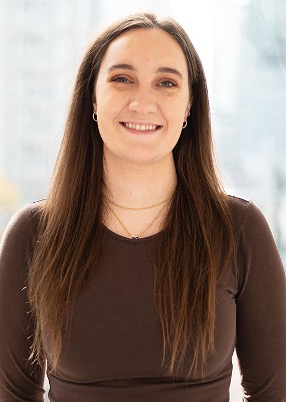Alumni Spotlight on Emily Shiplett
I know that whatever field I go into I will approach it with the skills and information that I have learned through CRS.
Emily Shiplett, MS
MS-RSM Class of 2024
Emily Shiplett is a graduate of the MS-RSM program, class of 2024. She completed the non-thesis track and conducted research with Dr. Pamela Monahan. She is currently at medical scribe primary care clinic.
Mentor: Pamela Monahan, PhD
Project Title: “A tale of two pathways: examining the interactions between notch and activin signaling in the prepubertal granulosa cell”
What is your connection to the CRS community and what is your current position?
I am an alum of the MS-RSM program (non-thesis track) and I currently work at a clinic.
Could you describe your current research/studies?
I have been working as a scribe in a primary care clinic that services older and/or disabled individuals. I have been able to learn more about how reproductive health fits into family medicine.
What aspect(s) of CRS did you find the most valuable?
The support from members of CRS (faculty, staff, alumni) is incredible. I appreciated that the smaller class size meant that it was easier for students to connect with each other and the faculty. Despite coming into the MS-RSM program with previous lab experience, I learned a lot about how to improve my research skills. I am also so appreciative to have learned “proper etiquette” for networking, especially online.
What has been the most valuable aspect to your training as a reproductive scientist in CRS?
I think being able to build a solid foundation of reproductive science has been most valuable. I know that whatever field I go into I will approach it with the skills and information that I have learned through CRS. Through CRS, I have gained a perspective to research and healthcare that I did not have before.
What would you recommend for a junior scientist in order for them to succeed in their scientific careers?
Find a topic that you are passionate about and be curious. Learn from as many people and master as many skills as you can, but also don’t be discouraged when things don’t work on the first, second, or even third try. There’s a lot of “failure” in science - I accidentally swapped two reagents that started with the same letter the first time I performed an RNA extraction, needless to say it did not work - but mistakes and “negative” data are still useful in guiding your own work and your projects. Stay passionate about your project, especially as you have to get through obstacles.
What do you think will be the next big contribution in the reproductive biology field?
I think that there is so much more to know that it is hard to narrow it down. I’m kind of hopeful that early diagnosis, more effective diagnostic tools, and/or more effective treatments for reproductive cancers are developed.
Do you have any notable stories from your time in CRS?
During the non-thesis project, I really enjoyed going to Hoosier Mama to work with my research group. It was a great place to perfect our presentations (I also highly recommend their London Fog). At the end of the year, after we had completed our non-thesis project presentations, we had lunch with a very special guest, Rufus. I had the privilege of taking him on a short walk around Northwestern with some of the other MS-RSM students and we had a great time.
